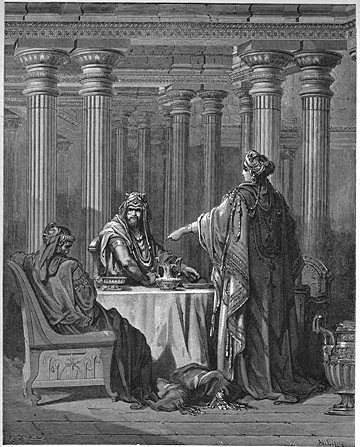Esther 7
1 The king and Haman went to Queen Esther's dinner.
Ko ia naʻe haʻu ai ʻae tuʻi mo Hamani ki he kātoanga mo Eseta ko e tuʻi fefine.
2 At this second dinner, as they were drinking wine, the king asked Esther again, “What are you really asking for, Queen Esther? It will be given to you. What do you want? You shall have it, as much as half my empire!”
Pea naʻe toe lea ʻae tuʻi kia Eseta ʻi hono ua ʻoe ʻaho ʻi he kātoanga inu uaine, “Ko e hā hoʻo kole ʻe tuʻi fefine ko Eseta? Pea ʻe tuku ia kiate koe: pea ko e hā ia ʻa hoʻo kole? Pea ʻe fai ia ʻo aʻu ki hono vahe ua ʻoe puleʻanga.”
3 Queen Esther answered, “If the king looks on me favorably, and if it please Your Majesty to grant me my life, that is my request; and the lives of my people, that is what I ask.
Pea lea ai ʻa Eseta ko e tuʻi fefine, ʻo ne pehē, “Kapau kuo u maʻu ʻae ʻofa ʻi ho ʻao, ʻE tuʻi, pea kapau ʻoku lelei ki he tuʻi, ke foaki ʻeku moʻui kiate au ʻi heʻeku kole, mo hoku kakai ʻi heʻeku tala:
4 For my people and I have been sold to be destroyed, killed, and annihilated. If we had only been sold as slaves, I would have kept quiet, because our suffering would not have justified disturbing the king.”
He kuo fakatau ʻakimautolu, Ko au mo hoku kakai, ke maumauʻi, mo tāmateʻi, pea ke fakaʻauha. Pea ka ne fakatau ʻakimautolu ke hoko ko e kau tangata pōpula, mo e kau fefine pōpula, pehē, te u longo pe au, ka ko e moʻoni ʻe ʻikai mafai ʻe he fili ke totongi hono kovi ki he tuʻi.”
5 The king asked Queen Esther, demanding to know, “Who is this? Where is the man who has dared to do this?”
Pea naʻe lea ai ʻae tuʻi ko ʻAhasivelo kia Eseta ko e tuʻi fefine ʻo pehē, “Ko hai ia, pea kofaʻā ia, ʻaia naʻe fielahi ʻi hono loto ke fai pehē?”
6 “The man, the opponent, the enemy, is this evil Haman!” Esther replied. Haman shook with terror in front of the king and the queen.
Pea naʻe pehē ʻe Eseta, “Ko e tangata angatuʻu mo e fili, ko Hamani angakovi ni.” Pea naʻe toki manavahē ʻa Hamani ʻi he ʻao ʻoe tuʻi mo e tuʻi fefine.
7 The king was furious. He got up, leaving his wine, and went out into the palace garden. Haman stayed behind to beg for his life from Queen Esther, for he realized the king planned an evil end for him.
Pea naʻe tuʻu hake ʻae tuʻi ʻi heʻene tuputāmaki lahi mei he kātoanga uaine, pea ʻalu kituʻa ia ki he ngoue ʻoe fale; pea naʻe tuʻu hake ʻa Hamani ke fai ʻae kole koeʻuhi ko ʻene moʻui kia Eseta ko e tuʻi fefine; he naʻe mamata ia kuo tuʻutuʻuni ʻae kovi ke hoko kiate ia mei he tuʻi.
8 When the king came back in from the palace garden to the dining room, Haman had thrown himself on the couch where Queen Esther was. The king shouted out, “Is he even going to rape the queen here in the palace, right in front of me?” As soon as the king said this, the servants covered Haman's face.
Pea naʻe liu mai ʻae tuʻi mei he ngoue ʻoe fale, ki he potu ʻoe kātoanga uaine: pea kuo tō ʻa Hamani ki he tokotoʻanga ʻaia naʻe ʻi ai ʻa Eseta. Pea pehē ʻe he tuʻi, “Pea ʻe tohotoho ʻe ia ʻae tuʻi fefine foki ʻi he fale ʻi hoku ʻao?” Pea ʻi he ʻalu ʻae lea mei he fofonga ʻoe tuʻi, naʻa nau ʻufiʻufi ʻae mata ʻo Hamani.
9 Then Harbonah, one of the eunuchs attending the king, said: “Haman set up a pole beside his house for Mordecai, the one whose report saved the king's life. The pole is fifty cubits high.” “Impale him on it!” the king ordered.
Pea pehē ʻe Hapona ko e tauhi fale ʻe tokotaha ʻi he ʻao ʻoe tuʻi, “Vakai foki, ko e tautauʻanga, ko e hanga ʻe teau hono māʻolunga, ʻaia naʻe ngaohi ʻe Hamani moʻo Motekiai, ʻaia naʻe lea lelei maʻae tuʻi, ʻoku tuʻu ʻi he fale ʻo Hamani.” Pea pehē ai ʻe he tuʻi, “Tautau ia ki ai.”
10 So they impaled Haman on the pole that he had set up for Mordecai. Then the anger of the king died down.
Ko ia naʻa nau tautau ʻa Hamani ʻi he tautauʻanga naʻa ne teuteu moʻo Motekiai. Pea naʻe toki lolou ʻae houhau ʻita ʻae tuʻi.





















